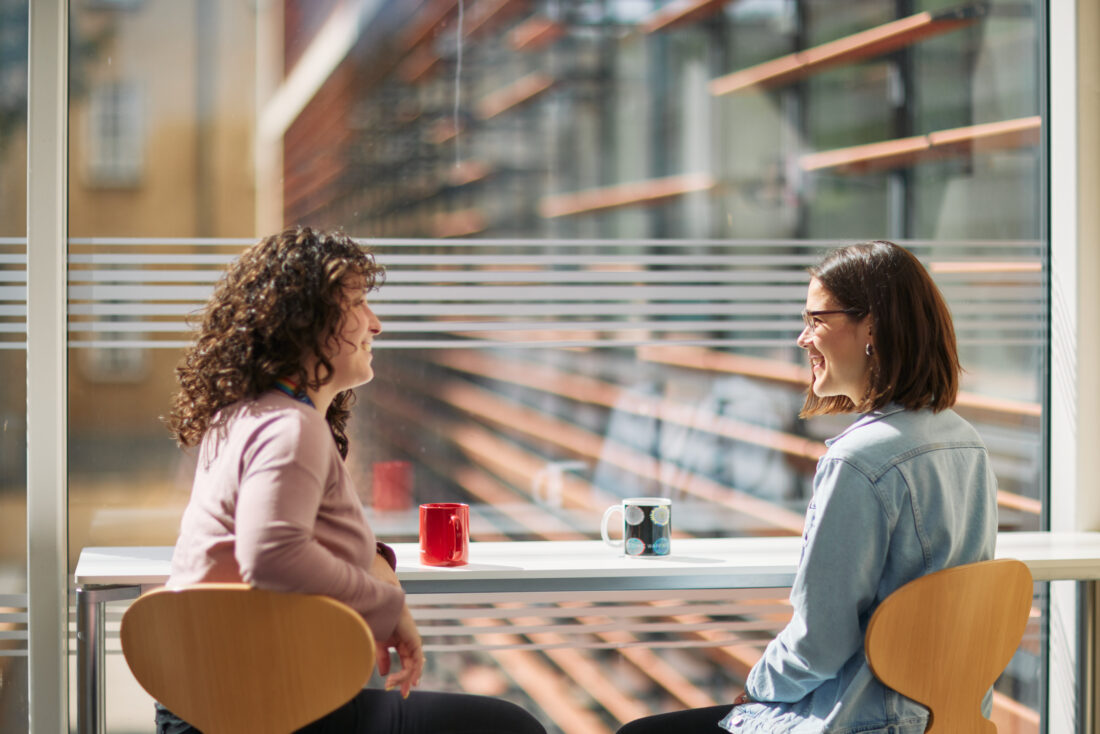
The epicentre of a postdoc’s research life is the group that they join and their supervisor. But the Department can add great value, reflecting our vision that everyone who works or studies here feels as much a member of the Dunn School, as of their individual group.
We encourage all our postdocs and research staff to consider taking advantage of these opportunities, in discussion with their supervisor and mentors.
Mentoring
Primary mentorship is the role of a researcher’s group leader. In addition, all postdocs and research staff are encouraged to join our departmental-wide mentoring scheme, which includes small group peer- and PI-led mentoring. Each mentoring cycle runs for 12 months, allowing for several mentoring experiences over a Dunn School career.
Training
All postdocs and research staff have the right to 10 days of leave a year for training and career development. As employees of the University of Oxford, they have access to a very wide range of courses and training sessions, some organised at departmental level, others in the central University. As a department, the Dunn School enhances these opportunities by making available grants to support attendance of external courses not available locally.
Writing, Presenting and Communicating
These are core skills that underpin success in any professional career track and we offer many ways of gaining experience. Presentation skills, both posters and talks, are developed as part of progress seminars and the annual postdoc symposium. Joining our news team is a great opportunity to improve both scientific and public-facing writing, and we occasionally host writing workshops with author and science journalist Roger Highfield (a Dunn School visiting professor). Public engagement is also encouraged, and there are opportunities for projects in the local community (e.g. through local schools) as well as internal grants to support new initiatives.
Leadership development
We are developing a leadership skills training programme, open to all, to provide training in a range of skills required for those moving to more senior positions. We also provide a variety of opportunities to gain experience of positions of influence and to develop citizenship and leadership skills, particularly through membership of the Postdoc and Research Staff Association (PRSA) committee, and the opportunity to organise our annual postdoc symposium. Postdocs are also encouraged to chair departmental symposia sessions, our internal progress seminars, and to host external speakers.
Transition to independence
Funding success is particularly important at the transition to independence stage. To help our postdocs build their funding portfolio, we run regular workshops on how to apply for funding and explain the various routes to independence; provide comprehensive financial and administrative support for applications, as well as proposal feedback and mock interviews provided by more senior members of the department; and provide a regular email roundup to summarise upcoming internal and external funding opportunities.
We also offer our own internal pump-priming grants (‘Dunn School Pathway to Independence grants’) of up to £10k, allowing postdocs the funds to develop independent ideas and acquire preliminary data.
Teaching Experience
Teaching is not required or expected from our postdocs, but it can be useful to gain experience and enhance CVs. There are many opportunities as part of departmental and university teaching:
- Mentoring and co-supervising of DPhil, masters and undergraduate students
- Contributing to practical classes and lectures
- Access to tutorial teaching experience
Postdocs or research staff interested in taking advantage of teaching opportunities should approach Prof Ulrike Gruneberg.
Dunn School community
We foster an open door, consultative and collegiate culture. Social events help foster this environment, from regular coffee breaks organised by the PRSA to the departmental monthly Dunn Drinks, Christmas and summer parties, as well as opportunity for refreshments and informal networking after our seminars. The ‘Get to know you’ discussion series provides and informal and candid environment to hear from more senior colleagues on their career trajectory and experience. We also place real emphasis on providing a family-friendly environment. Grants are available for caring support, for example to help attend scientific conferences or other career development opportunities. In addition, the Dunn School provides all staff with a range of other measures (work flexibility, core hours for meetings, access to university nurseries, etc) aimed at helping the complex balance between professional and home life.
Careers, inside and outside academia
The Dunn School aims to provide a launch pad for the careers of all our research staff, whether or not they want to pursue an academic route. Beyond the wide-ranging opportunities for academic mentorship, and the University’s Careers Service, we host seminars with external speakers including, very often, former Dunn School members, who have pursued different career paths. Our departmental mentoring scheme also includes mentoring opportunities for those considering careers outside academia. In addition, and extending the theme that we are willing to provide targeted financial support to support career development, personal grants are available for career development opportunities.
Postdoc and Research Staff Association
The PRSA exists to represent and support all research staff in the Dunn School and is run by a group of volunteers.
Research Groups
Over 30 groups work to uncover the molecular and cellular mechanisms underlying disease, in a supportive environment with access to state-of-the-art scientific facilities.
Working in the Dunn School
Staff at the Dunn School benefit not just from our supportive and inclusive environment, but also have access to wider benefits as members of the University of Oxford.